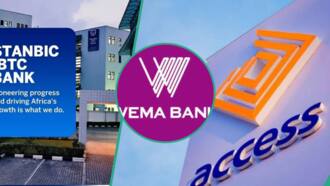CBN Announces Dollar Inflow Into Nigeria Rises to $10bn in 2 Months, Gives Breakdown
- The Central Bank of Nigeria has revealed that the country recorded increase foreign exchange inflow in just 2 months
- The CBN receives foreign exchange inflows from crude oil sales and other sources of revenue on behalf of the government.
- Also banks and other international payment companies are source of inflow for investments, diaspora remittance among others
PAY ATTENTION: Click “See First” under the “Following” tab to see Legit.ng News on your Facebook News Feed!
Central Bank of Nigeria (CBN) has announced that Nigeria recorded $10.7billion aggregate foreign exchange inflow into the economy in April and May 2023.
The CBN disclosed this in its latest economic report on foreign exchange flows, which was obtained by Legit.ng from its website.

Source: Facebook
Foreign exchange inflow
According to the report, the economy recorded a higher net foreign exchange inflow in May relative to the preceding month, Punch reports.
PAY ATTENTION: Share your outstanding story with our editors! Please reach us through info@corp.legit.ng!
It stated that:
“Foreign exchange flow through the economy recorded a net inflow of $3.59bn, compared with $2.02bn in the preceding period.
“Aggregate foreign exchange inflow into the economy increased by 29.1 per cent to $6.03bn, from $4.67billion in the preceding month.
"However, foreign exchange outflow fell by 8.2 per cent to $2.44billion from $2.65billion in the preceding month.”
According to the CBN, foreign exchange inflows through the Bank decreased by 27.9 per cent to $1.70billion, from $2.36billion in April.
Foreign exchange outflow
Also the report showed that outflow through the Bank fell by 15.2 per cent to $2.03billion, from $2.39billion in April.
The report said:
“As such, the CBN recorded a net outflow of $0.33billion, compared with a net outflow of $0.03billion in the preceding month."
It added that autonomous inflow increased by 87.2 per cent to $4.33billion from $2.31billion in the preceding month.
Similarly, autonomous outflow increased to $0.41billion from $0.26billion in April.
Consequently, a net inflow of $3.92billion was recorded, compared with $2.05billion in April.
The Autonomous FX market, according to FMDQ, comprises recognized FX trading segments, including but not limited to the Inter-bank market, the I&E FX window, and any such approved and recognized trading segment as may be defined.
Data from the economic report of the CBN shows that a net FX inflow of US$3.92 billion was recorded in the autonomous market, compared to US$2.05 billion in April.
Autonomous inflow increased by 87.2 per cent to $4.33 billion in the month under review from $2.31 billion in the preceding month.
Similarly, autonomous outflow increased to $0.41 billion from $0.26 billion in April.
CBN faces another headache as Nigeria’s foreign reserves fall to 2-year low
Meanwhile, in another report, Legit.ng revealed that Nigeria's foreign reserve has hit a two-year low.
The data obtained from the CBN showed that Nigeria's reserves at $33 billion were the lowest since 2017.
The foreign reserves are a key firepower for the CBN in its fight to ensure the naira stays strong against other currencies at the foreign exchange market.
Source: Legit.ng



